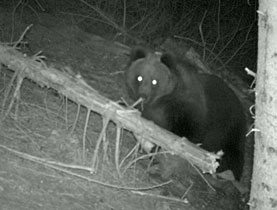
Shooting of wayward bear sparks criticism

Animal and environmental protection groups have strongly criticised the shooting dead of the "problem" brown bear JJ3 in eastern Switzerland on Monday.
WWF said it was considering legal action in the case, while Italian organisations called the killing barbaric and unjustified. But authorities defended their decision, saying it was an isolated case.
The bear was killed in the Thusis region of canton Graubünden because local authorities decided it presented too great a risk to humans. JJ3 had taken to foraging for food in inhabited areas.
“We couldn’t take the potential risk that JJ3 might injure or kill someone,” local politician Stefan Engler told a news conference.
In a statement the WWF said more bears were likely to migrate into Swiss territory soon. “Therefore the shooting of JJ3 is no solution,” Kurt Eichenberger said.
“JJ3 came very close to humans on his forays but he was never aggressive towards them,” he added.
According to the WWF, more should have been done to scare the bear away and the opportunity to raise awareness and to debate the best way to deal with problem bears was missed.
The cantonal authorities, which had been tracking the male bear since its arrival in the region from Italy in June 2007, did try to drive the animal away with rubber bullets, firecrackers and warning shots but JJ3 just moved on to other populated areas.
Bear-proof bins
In an effort to address the problem of bears foraging in bins, WWF commissioned a Swiss company to make bear-proof waste containers, which are currently being distributed in the bear areas of Graubünden.
The untimely end of JJ3 also provoked criticism in his country of origin. One Italian animal protection organisation, Associazone Animalisti Italiani, said the killing was unjustified and criminal. It called for a boycott on Swiss goods and travel to Switzerland.
An environmental group, Legambiente, called the shooting a barbaric act and it complained that Switzerland and Italy were the only two countries that had not yet ratified the implementation protocol of the Convention on the Protection of the Alps.
The wayward bear was fitted with a tracking device before it began its four-month hibernation. Local authorities have spent some SFr300,000 ($299,925) monitoring the animal since it crossed over into Switzerland last year.
Switzerland’s “Bear Strategy” maintains that bears and humans can co-exist peacefully but enables regional authorities to act if public safety is threatened.
The head of hunting and wildlife at the Federal Environment Office told swissinfo that JJ3 was an isolated case and that it was possible to provide a habitat for wild predators in Switzerland.
“Last resort”
“Shooting is really a last resort when an animal behaves in non-typical way,” Reinhard Schnidrig told swissinfo.
“Bears adapt and learn quickly so when a bear loses its natural fear of humans at an early age and comes to villages looking for food, which was sadly the case with JJ3, it’s a problem.”
When this happens it is no longer possible for bears and humans to live together, Schnidrig explained.
“But this does not mean that Switzerland cannot provide a habitat for bears. On the contrary, I am sure that we will soon have a permanent presence of bears here.”
Meanwhile Switzerland’s last remaining bear MJ4, a three-year-old male, is a shy animal that is steering clear of humans. His crimes so far include the occasional sheep attack and he has been known to raid one or two hives for honey.
Two-year-old JJ3 arrived in the area from Italy in June 2007 and was fitted with a tracking device last year.
JJ3 caused problems last year, destroying rubbish bins around the Lenzerheide resort and in the Albula valley. The cantonal government decided it would be killed if it moved into populated areas again.
JJ3’s mother Jurka is in captivity in Italy.
His brother JJ1, also known as Bruno, was killed after roaming into Bavaria from Austria in 2006.
His other brother, JJ2, was the first brown bear to be spotted in Switzerland for over a century.

In compliance with the JTI standards
More: SWI swissinfo.ch certified by the Journalism Trust Initiative






























You can find an overview of ongoing debates with our journalists here . Please join us!
If you want to start a conversation about a topic raised in this article or want to report factual errors, email us at english@swissinfo.ch.